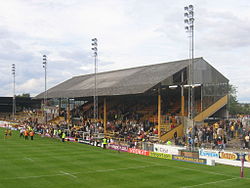This article needs additional citations for verification .(December 2009) |
| 1995 Emerging Nations World Championship | |
|---|---|
| Number of teams | 7 |
| Host country | |
| Winner | |
| Matches played | 10 |
| Attendance | 24,260 (2,426 per match) |
| Top scorer | |
| Top try scorer | |
The 1995 Rugby League Emerging Nations World Championship was held alongside the Centenary Rugby League World Cup. Although the competition received little build-up or promotion, the novelty value of the teams taking part encouraged relatively large crowds, and the competition was a success. A crowd of 4,147 was present at Gigg Lane, Bury for the final between the Cook Islands and Ireland. [1]





